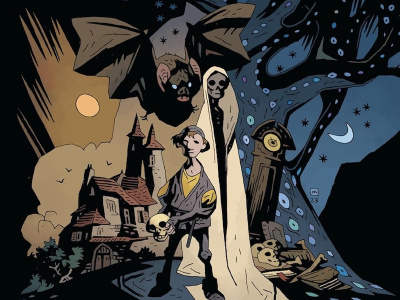J.J. Abram’s Star Wars Episode VII: The Force Awakens is not your average blockbuster. The Star Wars sequel dropped only 38% from its record setting opening as it set a new round of box office records in its sophomore session in theaters. The Force Awakens' $153 million second weekend obliterated the previous non-debut weekend record of $106 million set earlier this year by Jurassic World. It took only 12 days for The Force Awakens to reach the $1 billion mark worldwide besting Jurassic World’s previous record of 13 days (Jurassic’s total was aided by a release in China, the world’s second biggest market, where The Force Awakens won’t open until January 9). The Force Awakens helped propel the box office to its first $300 million weekend ever, boosting the total 42.3% from the same weekend last year when The Hobbit 3 earned $41 million.
The Force Awakens’ second weekend performance was especially impressive because it came in the face of competition from four major new wide releases. Having earned $544 million in just ten days, it is now clear that The Force Awakens will eclipse Avatar’s domestic box office record haul of $760.5 million (not accounting for ticket price inflation). In fact a domestic total of more than $1 billion is not out of the question, since it is already clear that the successful relaunching of the Star Wars franchise is a major cultural phenomenon as well a box office juggernaut—the Star Wars mythology is becoming as ubiquitous and important in contemporary culture as the Homeric epics were to the ancient Greeks. The week between Christmas and New Year’s is traditionally one of the biggest movie-going periods in the entire year, so how The Force Awakens continues to perform during this period will have a major impact on how much the film will earn in the domestic market, where it appears likely to set a record that could stand for quite some time (especially if movie ticket prices remain relatively flat as they have for the past 2 years).
Second place this weekend went to Daddy’s Home, a heavily-advertised comedy that pits a hapless stepdad played by Will Ferrell against a supercool divorced dad played by Mark Wahlberg, who is visiting his children over the holidays. Daddy’s Home earned an estimated $38.8 million, the fifth best Christmas weekend opening ever, and Ferrell’s biggest opening since Talladega Nights ($47million) in 2006. The very broad comedy of Daddy’s Home did not appeal to the critics, who gave it a lowly 28% positive rating on review aggregator Rotten Tomatoes, but the film proved to be an excellent big of counterprogramming to Star Wars, and audiences obviously turned out for this star power-driven comedy.
Third place went to Joy, which stars Jennifer Lawrence in a true life saga of the female inventor of the “Miracle Mop,” directed by David O. Russell, who wrote and directed Lawrence in two previously well-received holiday releases, Silver Linings Playbook and American Hustle. Joy has not received the kind of critical accolades that those two other films did (it is currently at 57% positive), but Lawrence’s starpower is burning even brighter now, and the film’s $17.5 million debut, versus the $19 bow of American Hustle, can be seen as a very solid performance in the face of major competition across the board. Like Russell’s two previous collaboration with Lawrence, Joy has Oscar ambitions—and nominations could potentially help Joy end up in the same box office neighborhood of American Hustle ($150 million). Opening weekend audiences for Joy were predominantly female (66%), older (77% over 25) and Caucasian (67%).
The Tina Fey/Amy Poehler R-rated comedy Sisters took fourth place, earning $13.9 million and driving its domestic total to $37.1 million after ten days. How Sisters fares over the next couple of weeks should decide the financial fate of the $30 million production. The pedestrian animated feature Alvin and the Chipmunks: The Road Chip took the fifth spot with an estimated $12.7 million, and with nearly $40 million earned so far, the franchise appears to be safe, though it remains about 20% behind the totals of previous Alvin movie.
Concussion, which examines the dark side of the most popular sport in the country (pro football), would appear to be tough sell as a holiday movie, but the film, which stars Will Smith, managed to earn $11 million in its debut. Opening weekend audiences were evenly split between the genders, and a bit older (62% over 25).
Adam McKay’s The Big Short, which examines the financial debacle of 2008 in some detail, expanded from 8 to 1,585 theaters (effectively making it five new wide releases this weekend), and did quite well, earning an estimated $10.5 million. The Big Short is the kind of serious adult drama that should have a very long run in theaters, especially if the film receives its expected Oscar nominations. So far at least it appears that attacks on the movie from the right wing Murdoch newspapers (and networks) have had little apparent effect on The Big Short’s box office.
The other wide new release, the remake of the extreme sports caper film Point Break, fared poorly, earning slightly less than The Big Short despite being in almost twice as many theaters. Point Break’s problem is the film’s $105 million production cost, and with its lackluster domestic debut, it will have to do its damage overseas, because it looks like its domestic run will be a wipeout. This remake of the Patrick Swayze, Keanu Reeves 1991 action classic attracted an audience that skewed male (56%) and older (67% over 25).
In addition to what was essentially five new wide releases, there were two limited debuts of note. Quentin Tarantino’s visually stunning revenge western The Hateful Eight ended up at number 11 in spite of the fact that it was shown only in 100 theaters (all of which showed the movie on film, instead of digital, and in the extra-large 70mm format in which the movie was photographed. The movie’s per screen average of over 45K was the best this year for any film with more than 25 screens, except for The Force Awakens’ superlative $58K per screen showing last weekend. The Hateful Eight, which cost about $60 million to produce, is off to a solid start, indicating that the film’s performance will bear watching in the early weeks of 2016.
Opening in just four theaters, Alexander Inarritu’s The Revenant, which stars Leonardo DiCaprio in a punishing performance as an early 19th Century mountain man, earned an impressive $471K. This $135 production will go wide in two weeks, and appears to be a lock for several Oscar nominations.
Be sure to check back here next week to see if The Force Awakens can make it three weekends in a row in the face of direct competition from The Hateful Eight, which will expand nationwide.

Fastest Film Ever to $1 Billion Worldwide
Posted by Tom Flinn on December 27, 2015 @ 1:06 pm CT
MORE COMICS
ComicHub and BookScan Best-Seller Lists Reveal Diverging Tastes
August 20, 2025
A look at the ComicHub and BookScan best-seller lists shows that comic shop customers are snapping up a wide variety of indy and retro horror.
Italian Original Raised Over $36,000 on Indiegogo
August 20, 2025
The Italian crowdfunding campaign for the first edition raised over $36,000 from 953 backers on Indiegogo.
MORE NEWS
New 2E Rulebook
August 20, 2025
Paizo, Inc. revealed Alien Core 2 , a new rulebook for Starfinder RPG 2E.
New Booster Set
August 20, 2025
Bushiroad unveiled DanDaDan , a booster set for Weiss Schwarz.








